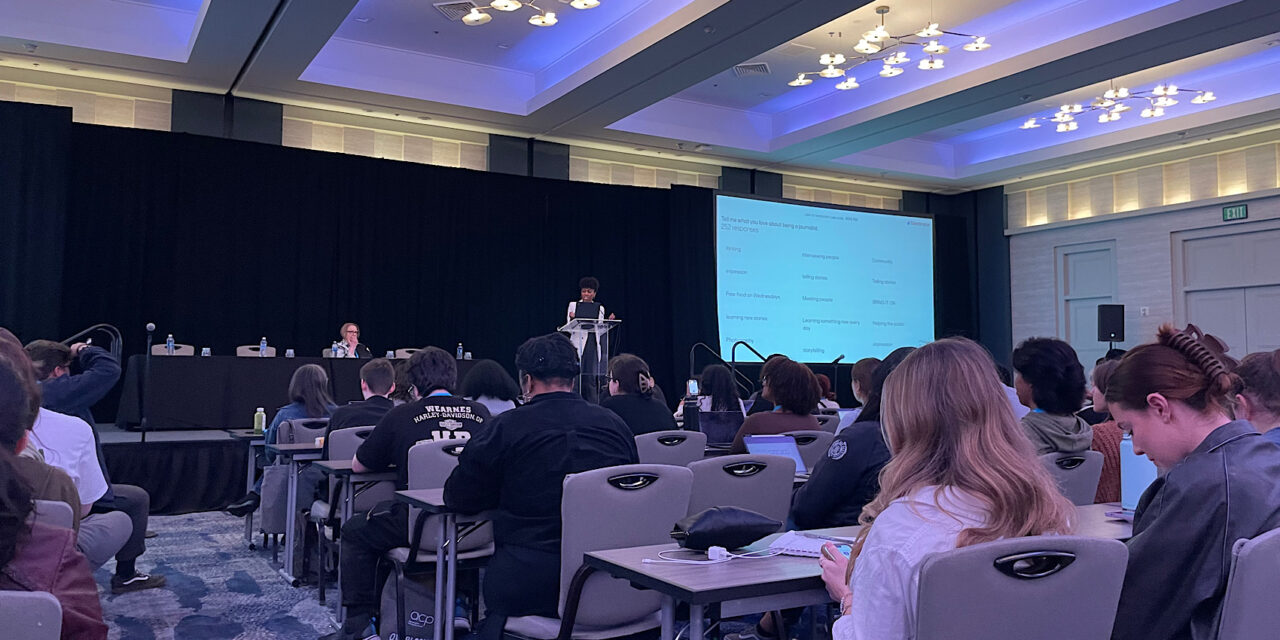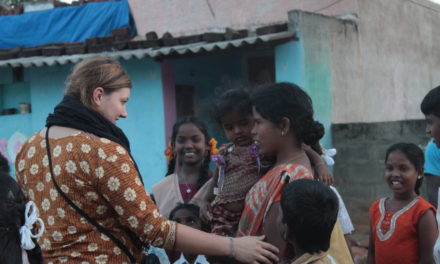SPJ President Ashanti Blaize-Hopkins presents to a crowd at the ACP Spring National College Media Conference as a keynote speaker (Photo by Shawna Takaki).
By Shawna Takaki | Staff Writer
From March 7-9 last month, the staff writers of Kapiʻo News departed to California for the ACP Spring National College Media Conference, an event held by the Associated Collegiate Press, which brings together student journalists, advisors, and professionals from the entire country.
What emerged, after attending numerous breakout sessions and hearing from various keynote speakers, as a main takeaway from my experience at the conference was an affirmation of student journalism’s importance to any college campus.
I’ve been a staff writer with Kapiʻo News for roughly two years now, and this experience has enlightened me on the role of journalism in our greater society. Before, I would’ve likely had a much vaguer view of why exactly it’s important.
Journalists are the people who disseminate knowledge to the world, gathering facts and synthesizing it for people to understand. One of the most pressing issues of our current social climate is the large swatches of unchecked misinformation that people buy into. With a lot of information being spread through social media, and with many sources of fake news, it’s more important than ever to search out accurate information. This is what journalism is essential for.
According to the 2023 State of Local News, there are many counties in our country with only one news outlet local to the area, with more than 200 counties lacking one completely. This was a fact that struck me to hear. At the conference, on the first day, SPJ President Ashanti Blaize-Hopkins presented on the future of journalism, and what the power that students held could be. She talked about these news deserts, and how in certain places around the country, the student newspaper is one of the only sources of information for the specific information around town.
We all get our news thanks to journalists – and campus newspapers are especially important to students because they report on news that can’t be found anywhere else, and preserve the student voice.
In a student newspaper, you can find stories about the people on campus, such as features on different students on campus. Kapiʻo has written multiple stories about our students, something you can really only find from us. One recent article was focused on a Kapi‘olani Community College student’s story, bringing him all the way from Afghanistan to our campus. Student newspapers also report on opportunities that students have on campus, such as workshops offered on campus about Native Hawaiian printing or updates on other events. And of course, there are many opinion pieces that have been written by our staff writers from a specifically student perspective, such as one on student loan forgiveness.
These are topics that can’t be found anywhere else other than specifically at a college’s student newspaper, because it is the only place that can report on what is important to a student population.
Most crucially, the student voice can bring forth change when it is needed, such as this story from last year. The Daily Northwestern, the student newspaper for Northwestern University, independently investigated and reported on a coach on their campus who was suspended, uncovering details that the university didn’t make public. It was the reporting of the student newspaper that eventually got him fired.
Another hot topic was what Stanford University’s newspaper, The Stanford Daily, uncovered. Student reporters found out about the president of the university’s research misconduct, and the story written led to his resignation. One instance of a viral instigator of chance was the front page of the The Daily Tar Heel, the student newspaper of the University of North Carolina. The page depicts text messages of fear from students during a lockdown due to an active shooter on the campus. This story resonated with many people, making its way to recognition from the White House on the important topic of gun violence.
It’s all of this that made being with other student journalists and professionals in the field at the conference empowering. Because student newspapers are of great importance to all of us.






